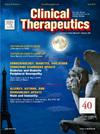系统性雌激素疗法与血栓形成:呼吁在急症护理中进行个性化临床决策》(A Call for Individualized Clinical Decision Making in the Acute Care Setting)。
IF 3.2
4区 医学
Q2 PHARMACOLOGY & PHARMACY
引用次数: 0
摘要
全身性雌激素疗法(SET)是医疗保健不可或缺的一部分,它在生殖权利、处理大量月经出血(HMB)、缓解更年期症状以及支持变性女性的性别确认激素疗法(GAHT)方面发挥着至关重要的作用。然而,SET 与静脉血栓栓塞症(VTE)风险增加有关,这给急诊护理工作带来了挑战。在此,我们探讨了在急诊护理环境中对出现激素相关 VTE 的患者进行 SET 的细微管理。在这种情况下停用 SETs 的普遍做法可能会导致严重的不良后果,包括 HMB 恶化、意外怀孕、更年期症状以及因中断 GAHT 或激素替代疗法而产生的心理困扰。停用 SET 会严重影响 HMB 患者的健康、生活质量和抗凝治疗的依从性,增加 VTE 复发的风险。我们对在急症护理环境中广泛停用 SET 的做法提出了质疑,主张采取以患者为中心的方法,考虑 SET 使用的根本原因、突然停药的潜在不良反应以及患者的个人需求。我们强调共同决策和个体化护理的重要性,尤其是对于医疗保健领域的历史边缘群体,如顺式女性、变性女性和高血压患者,以确保安全、公平和平等的医疗保健。在急症护理环境中采用量身定制的方法来管理 SET,将能改善医疗服务的提供并减少医疗不公平现象。最后,我们强调了进一步研究的必要性,尤其是针对变性女性与 GAHT 相关的 VTE。本文章由计算机程序翻译,如有差异,请以英文原文为准。

Systemic Estrogen Therapy and Thrombosis: A Call for Individualized Clinical Decision Making in the Acute Care Setting
Systemic estrogen therapies (SETs) are integral to health care, playing critical roles in reproductive rights, managing heavy menstrual bleeding (HMB), alleviating menopausal symptoms, and supporting gender-affirming hormone therapy (GAHT) for transwomen. However, SETs are associated with an increased risk of venous thromboembolism (VTE), posing a challenge in the acute care setting. Here, we explore the nuanced management of SETs in patients who present with a hormone-related VTE in the acute care setting. The prevailing practice of discontinuing SETs in this setting may lead to significant adverse effects, including exacerbation of HMB, unintended pregnancy, menopausal symptoms, and psychological distress from interrupted GAHT or hormone replacement therapy. The discontinuation of SETs can severely affect patients’ health, quality of life, and adherence to anticoagulation therapy in the case of HMB, increasing the risk of VTE recurrence. We challenge the practice of broadly discontinuing SETs in the acute care setting, advocating for a patient-centered approach that considers the underlying reasons for SET use, potential adverse effects of abrupt cessation, and individual patient needs. We underscore the importance of shared decision making and individualized care, particularly for historically marginalized groups in health care, cis women, transwomen, and individuals with HMB, to ensure safe, equitable, and affirming health care. A tailored approach to managing SETs in the acute care setting will enhance health care delivery and reduce health inequities. Lastly, we highlight the need for further research, particularly regarding GAHT-related VTE for transwomen.
求助全文
通过发布文献求助,成功后即可免费获取论文全文。
去求助
来源期刊

Clinical therapeutics
医学-药学
CiteScore
6.00
自引率
3.10%
发文量
154
审稿时长
9 weeks
期刊介绍:
Clinical Therapeutics provides peer-reviewed, rapid publication of recent developments in drug and other therapies as well as in diagnostics, pharmacoeconomics, health policy, treatment outcomes, and innovations in drug and biologics research. In addition Clinical Therapeutics features updates on specific topics collated by expert Topic Editors. Clinical Therapeutics is read by a large international audience of scientists and clinicians in a variety of research, academic, and clinical practice settings. Articles are indexed by all major biomedical abstracting databases.
 求助内容:
求助内容: 应助结果提醒方式:
应助结果提醒方式:


